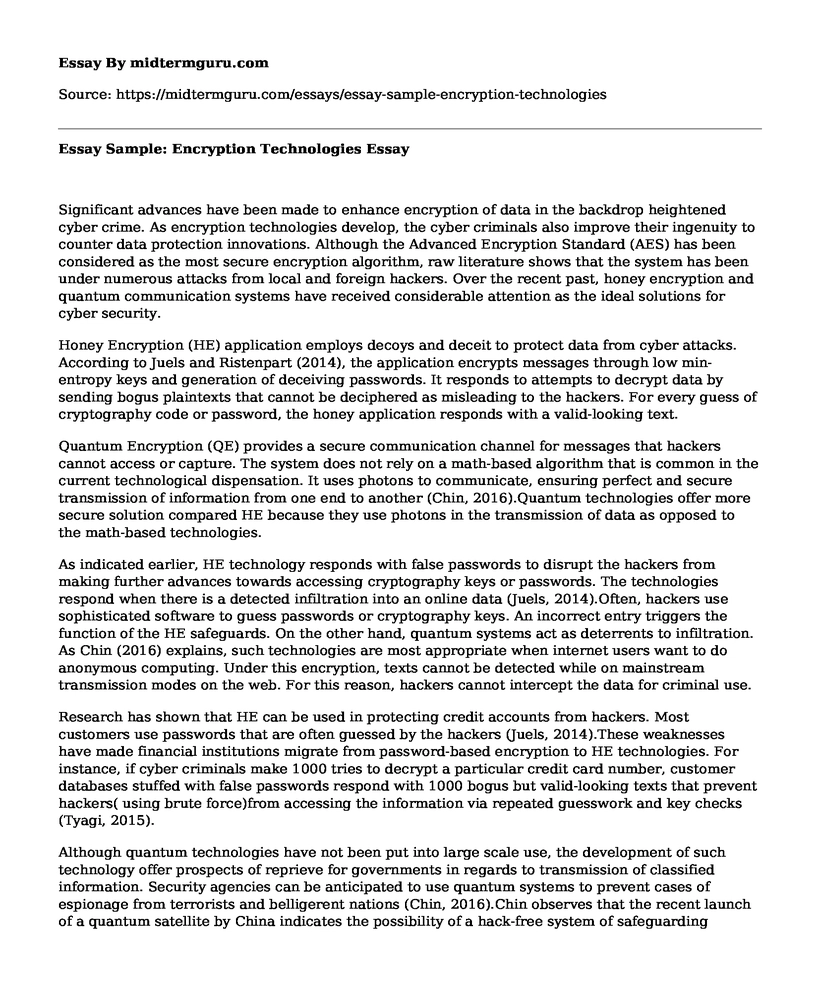Significant advances have been made to enhance encryption of data in the backdrop heightened cyber crime. As encryption technologies develop, the cyber criminals also improve their ingenuity to counter data protection innovations. Although the Advanced Encryption Standard (AES) has been considered as the most secure encryption algorithm, raw literature shows that the system has been under numerous attacks from local and foreign hackers. Over the recent past, honey encryption and quantum communication systems have received considerable attention as the ideal solutions for cyber security.
Honey Encryption (HE) application employs decoys and deceit to protect data from cyber attacks. According to Juels and Ristenpart (2014), the application encrypts messages through low min-entropy keys and generation of deceiving passwords. It responds to attempts to decrypt data by sending bogus plaintexts that cannot be deciphered as misleading to the hackers. For every guess of cryptography code or password, the honey application responds with a valid-looking text.
Quantum Encryption (QE) provides a secure communication channel for messages that hackers cannot access or capture. The system does not rely on a math-based algorithm that is common in the current technological dispensation. It uses photons to communicate, ensuring perfect and secure transmission of information from one end to another (Chin, 2016).Quantum technologies offer more secure solution compared HE because they use photons in the transmission of data as opposed to the math-based technologies.
As indicated earlier, HE technology responds with false passwords to disrupt the hackers from making further advances towards accessing cryptography keys or passwords. The technologies respond when there is a detected infiltration into an online data (Juels, 2014).Often, hackers use sophisticated software to guess passwords or cryptography keys. An incorrect entry triggers the function of the HE safeguards. On the other hand, quantum systems act as deterrents to infiltration. As Chin (2016) explains, such technologies are most appropriate when internet users want to do anonymous computing. Under this encryption, texts cannot be detected while on mainstream transmission modes on the web. For this reason, hackers cannot intercept the data for criminal use.
Research has shown that HE can be used in protecting credit accounts from hackers. Most customers use passwords that are often guessed by the hackers (Juels, 2014).These weaknesses have made financial institutions migrate from password-based encryption to HE technologies. For instance, if cyber criminals make 1000 tries to decrypt a particular credit card number, customer databases stuffed with false passwords respond with 1000 bogus but valid-looking texts that prevent hackers( using brute force)from accessing the information via repeated guesswork and key checks (Tyagi, 2015).
Although quantum technologies have not been put into large scale use, the development of such technology offer prospects of reprieve for governments in regards to transmission of classified information. Security agencies can be anticipated to use quantum systems to prevent cases of espionage from terrorists and belligerent nations (Chin, 2016).Chin observes that the recent launch of a quantum satellite by China indicates the possibility of a hack-free system of safeguarding government secrets.
Juels and Ristenpart (2014) note that the major benefit of HE technologies is the ability to provide security in situations where there is low entropy to repulse brute-force attacks that try all cryptography keys. Also, a repeated attempt to use credit card information with repeated responses may alert the service providers who can institute other safety measures. This way, it provides extra security compared to password-based systems. Moreover, it prevents partial disclosure of information to online platforms that may further increase the risk of data theft. This is achieved through the protection of the targeted information from unauthorized access. However, HE technologies have some disadvantages. Notably, the generation of bogus passwords does not prevent the attackers from making correct guesses of the passwords. This means that the applications are not tamper-proof as the discovery of the right key would lead to loss of data. Also, the system does not prevent tapping of data as in the case of quantum technologies (Juels, 2014; Tyagi, 2015).The inability to prevent interception of data creates a loophole for more information to be collected by the attackers who might use it in future successful attacks.
As highlighted in the preceding discussion, quantum communication technologies provide the safest channel for transmitting data. The use of photons to communicate allows the encoded information to be destroyed when a signal of interception is detected(Chin,2016).This secure platform not only protects access but also destroys the evidence of data transmission which can be exploited as long as it is accessible online. Since the use of quantum technologies has not taken place on a commercial scale, negligible disadvantages have been identified.
References
Chin, J. (2016). Chinas Latest Leap Forward Isnt Just GreatIts Quantum. Wall Street Journal.
Juels, A. (2014). A bodyguard of lies. Proceedings of the 19th ACM symposium on Access control models and technologies - SACMAT '14. doi:10.1145/2613087.2613088
Juels, A., & Ristenpart, T. (2014). Honey Encryption: Security Beyond the Brute-Force Bound. Advances in Cryptology EUROCRYPT 2014, 293-310. doi:10.1007/978-3-642-55220-5_17
Tyagi, N. (2015). Honey Encryption Applications. Massachusetts Institute of Technology.
Cite this page
Essay Sample: Encryption Technologies. (2021, May 20). Retrieved from https://midtermguru.com/essays/essay-sample-encryption-technologies
If you are the original author of this essay and no longer wish to have it published on the midtermguru.com website, please click below to request its removal:
- Essay on the Architecture of the Domains of a Company
- Parents Monitoring their Children on the Internet - Essay Example
- Questions and Answers on Identification of the Potential Causes of a Problem
- Paper Example on Security and Cyberterrorism
- Digital Privacy: Securing Your Data in the Age of Mobile Devices - Essay Sample
- Quantitative Research Approach for Data Collection on Chosen Topic - Essay Sample
- Digital Age: Impact on Democracy in the 20th Century - Essay Sample







